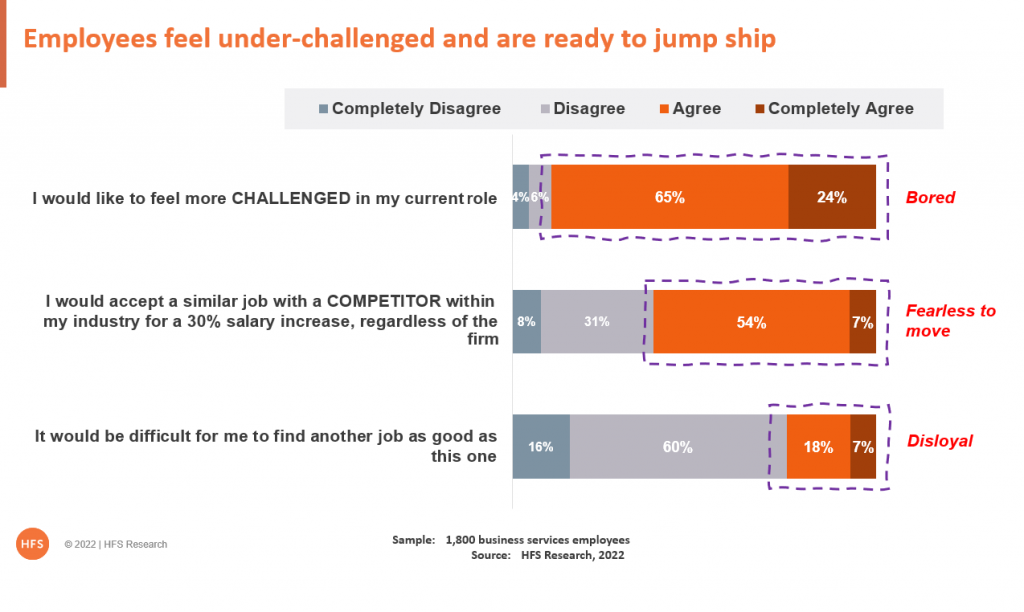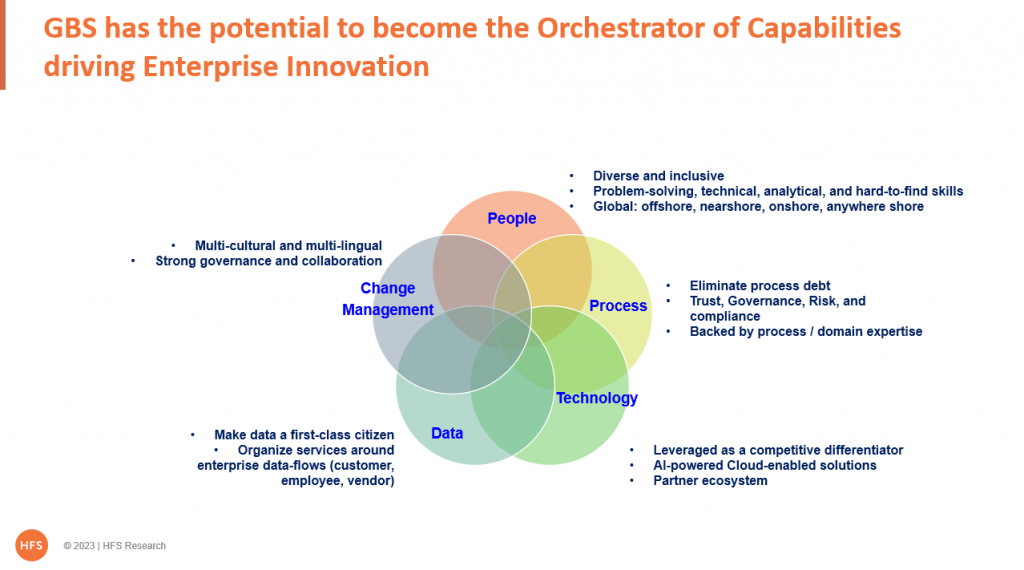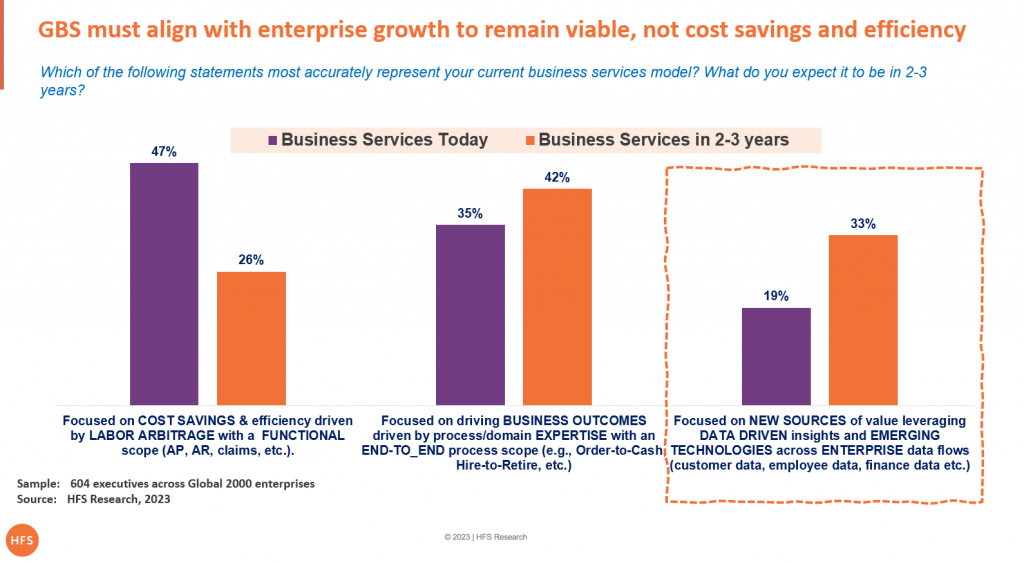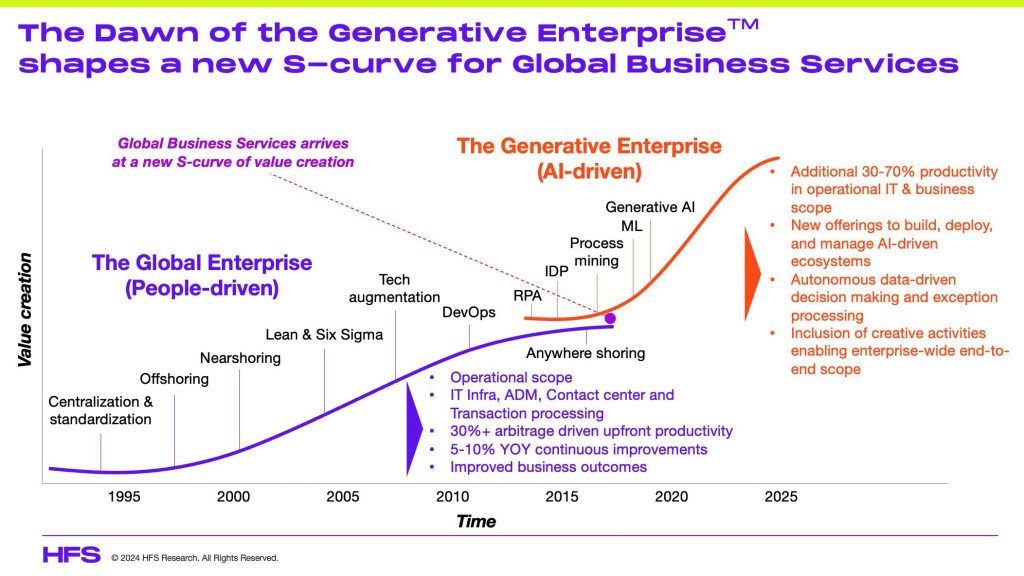In most of today’s Global 2000 enterprises, stodgy shared services are failing to deliver value beyond back-office support, provide exciting career tracks for ambitious professionals, and rarely provide anything to support the growth and innovation their companies so desperately crave.
The GBS model has had its time and is no longer relevant for ambitious enterprises
For more than two decades, Global Business Services (GBS), the centralized service delivery model leveraging a mix of internal shared services and/or 3rd party outsourcing, has been a tried-and-tested modus operandi for large enterprises to save costs, drive process discipline and improve compliance.
However, with the rapid advent of real generative AI capability, the current GBS model is dated, fails to deliver much (if any) value beyond cost and efficiency and has struggled to create viable career opportunities for ambitious talent. Let’s face it, GBS is still stuck squarely in the back office and fails to provide a career track for the best and brightest to pivot their firms into the generative AI era.
The GenAI era is finally driving much-needed change in business operations
After persisting with this tired old business operations model for so long, GenAI is forcing a major shift for ambitious enterprises striving to attract the talent they need to remain competitive and innovative. Many enterprises firmly glued to the old GBS model are in real peril of being left behind, lacking the culture, mindset and direction to remain relevant, viable businesses.
The ability for generative business services, where advancing AI technologies such as Large Language Models and autonomously-capable apps are driving the speed and predictive capability of enterprises to function with so much more agility, creativity, and intelligence.
Simply put, the time to make the move from back office to OneOffice is finally upon us (we introduced OneOffice seven years ago) and GenAI is the catalyst to force this change.
However, at HFS, we see two massive problems the current GBS proposition must overcome:
Problem #1. Cost and efficiency are now hygiene. Enterprises are on a mission to find new sources of value
How often does your CFO tell you, “We loved that 30% you took off the bottom line last decade; just relax and enjoy life”. With the advent and maturity of ERP platforms and outsourcing/offshoring, the role of shared services and GBS has been largely centered on the centralization of processes to drive efficiencies and partnering with outsourcing service providers to exploit lower-cost labor to reduce costs.
However, with most GBS organizations having maximized the cost and efficiency levers in recent years, the onus is now firmly shifting to genuine business transformation to provide faster, smarter data to drive rapid decisioning. That is the new lever that must be pulled by GBS to keep driving new thresholds of performance out of the business and support the growth agenda.
Cost savings are important but no longer sufficient to keep most operations leaders in their jobs. Minimizing costs to a desired level is one ceiling of achievement, but ambitious enterprise C-Suites have to keep striving for new sources of value to stay competitive in today’s era of rapid AI deployment.
Our research of over 600 business services decision makers across the Global 2000 reveals nearly 50% GBSes are happily focused on cost savings today. However, it is expected to halve in the next 2-3 years (See exhibit below). GBS services of the future must align with the enterprise growth agenda, not just better, faster, and cheaper operations.
GBS has a critical role in helping organizations balance the current digital dichotomy that nearly every enterprise faces: balance the macroeconomic “Slowdown” with the “Big Hurry” to innovate.
Problem #2. Young people don’t see GBS as an attractive career. It’s just not sexy
Research we conducted on employee experiences of 1800 business services staff shows close to 9 out of 10 want to feel more challenged (and are bored), 61% will jump to a competitor for a pay hike, and 75% believe they can easily find a job as good as the one they currently have:

It’s no wonder business services staff are quitting in droves in search of something more challenging when there is so much demand for workers to perform elsewhere. Now that next job may turn out no more challenging than their current gig, but if there’s 30% more money for doing it, why not?
Now we can moan and groan about the attitude and self-entitlement of some Gen-Zs and Millennials who have no loyalty, don’t care about longevity on their CVs, etc., but put yourself in their position: you’re ambitious, and other companies are offering you more challenging work, more money, and are simply more exciting places to work.
Why would you want to suffer a life of soul-crushing work for a company that still operates the same way it did 30 years ago? And can you blame staff for preferring to work from home than suffer from the monotony of a stuffy cube kingdom where most of the management isn’t even there? Let’s be blunt: it’s often the management who have become self-entitled, not the staff. The problem ultimately lies with bad leadership, not bad working attitudes, which is the reason why GBS has failed to provide real career options for our best and brightest.
The dawn of GenAI creates a once-in-a-lifetime opportunity for GBS to pivot
Global talent is what created the GBS model. Centralization, standardization, lean/six sigma, offshoring, nearshoring, technology augmentation and, more recently, anywhere shoring have been the pillars to drive down costs and improve productivity. The core business case for GBS revolves around 30%+ upfront arbitrage-driven cost savings and 5-10% YOY productivity with a veneer of better stakeholder experience and improved business outcomes. For enterprises that have been at it for decades, start realizing there is a limit to how much juice you can squeeze from a lemon and start witnessing diminishing returns. As we mentioned already, your C-Suite has long since stopped celebrating the costs you trimmed in the past, they will soon be demanding new thresholds of value that aligns with their innovation agenda (if they are not already).
GenAI is driving a whole new innovation agenda and GBS leaders must be part of the conversation
GBS leaders searching for the next big thing after “offshoring” may have their prayers answered with the dawn of GenAI. It promises a significant productivity improvement (not just incremental) on voice-based work, coding, testing, and transactional processing – the core of any GBS operation. What’s even more interesting is the ability of AI-driven operations to support autonomous decision-making, exception processing and the capability to handle a more creative scope of work (think art, writing, design) beyond mundane and boring activities.
The dawn of GenAI has created an inflection point for GBS to jump to a new S-curve of value creation:
The S-Curve we once knew as linear now has a huge kink in it: where we could save 20% here or 30% there with the use of smart automation, chatbots, and simply using better software and cheaper labor aligned to better processes is now up having a major shake-up – and this will happen quickly.
For example, one onshore call center operation has hooked up a GPT-4 bot to its Salesforce system and can already see how 50% of its staff can be reduced within months. There are many, many other cases quickly emerging – they are emerging almost daily as we all tinker with the disruptive potential this is going to have.
It’s time to stop underselling GBS as a large-scale operational entity. GBS has the potential to be an innovation capability orchestrator
The common perception within most enterprise stakeholders of GBS is associated with large-scale and process efficiency. GBS leaders must market their capabilities better. GBS can become the orchestrator of capabilities required for enterprise innovation if it stops underselling itself around running transactional processes for the enterprise:

The winning mantra for GBS is EX+PX = CX. In our obsession to deliver the best CX, we ignored EX for far too long. Thankfully, the “Great Resignation” of 2022 created the burning platform to at least try to resolve our talent equation. However, we are still missing an important stakeholder – the PX (Partner Experience). No-one-can-be-everything-to-anyone and more organizations are now realizing that they need an ecosystem strategy to be at the forefront, along with customers and employees (See HFS’ POV on OneEcosystem).
The bottom-line. Focusing on the old way of doing things is no longer the way forward for GBS
Successful GBS of the future needs to be training grounds for talent, data, and AI business models. GBS needs to be generative… by driving and promoting new ideas and ways of thinking and operating. The back office perpetuated by tired old GBS models has held back enterprises for far, far too long. The tools, know-how, and competitive realization are forcing the move to a generative mindset for those companies desperate to propel themselves forward into the GenAI-era. Don’t get left behind…
Posted in : Analytics and Big Data, Artificial Intelligence, Automation, Buyers' Sourcing Best Practices, Finance and Accounting, GenAI, Generative Enterprise, Global Business Services, HR Strategy, Sourcing Best Practises








